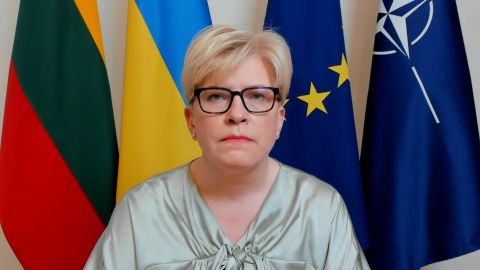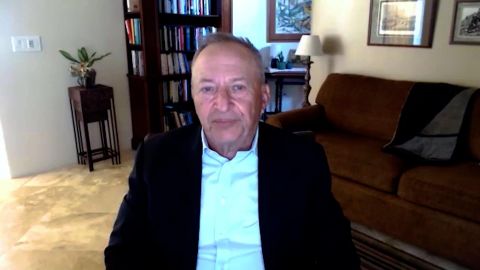Read Transcript EXPAND
CHRISTIANE AMANPOUR: So, the shock of what was discovered in territories around this capital is spurring further talk of sanctions against Russia, with this war, a lingering pandemic and inflation, some economists are warning of an impending recession. Here’s the former U.S. treasury secretary, Larry Summers, talking about the global impact with Walter Isaacson.
(BEGIN VIDEO CLIP)
WALTER ISAACSON, HOST: Thank you, Christiane. And, Larry Summers, welcome to the show.
LARRY SUMMERS, FORMER U.S. TREASURE SECRETARY AND FORMER DIRECTOR, NATIONAL ECONOMIC COUNCIL: Good to be with you.
ISAACSON: You said when you came on the show last time that overheating, over stimulus, too much federal spending was going to cause this inflation. And unfortunately, you turned out to be right. Do you think we also have to scale back fiscal policy, in other words, not pass more stimulus bills or COVID spending bills?
SUMMERS: I think we have to pay for any new spending in which we engage. If we have necessary spending, and I certainly think we do. I think it’s a tragedy and a crime that we’re not doing more to support international COVID efforts given that disease anywhere is a threat to people everywhere. I think we clearly, in light of what’s happening in Ukraine, are going to need to spend more on national defense. I think that because we have Ukraine, because we have a pandemic, none of that has made climate change a lesser problem. So, I do think we need to make fundamental investments, but we need to pay for those investments.
ISAACSON: In other words, we need to raise some taxes?
SUMMERS: We need to raise taxes. Some of the tax increases that we need to implement will be good even if we didn’t need the money. It is a tragedy that we are losing over a trillion dollars over the next 10 years because we don’t fund the IRS enough to enforce the tax law. We have had dozens if not a hundred returns of people or nonreturns of people who earn more than $10 million, never filed taxes, and the IRS didn’t even have the resources to notice in recent years. We have to invest in the IRS just to get back to where we were and there’s the potential to raise hundreds of billions of dollars that way. Secretary Yellen signed a historic agreement. I think it’s a really big deal with other countries designed to make sure that rich, multinational corporations could run, but they couldn’t hide, no matter how they accounted for their income, no matter where they placed it, they would pay taxes to one of the world’s countries. For that agreement to go into effect, we need to be taking action in the Congress to pass U.S. international tax reform. That needs to take place. There were other parts of the Trump tax cuts from 2017 that were giveaways. And that is something we should adjust, as well. So, certainly, we should not be ignoring fiscal policy at this key moment, Walter.
ISAACSON: What has the effect been of the sanctions in the Ukrainian war on our economy? And are those sanctions sustainable? I mean, could we continue to have rising price of bread because of this war? Rising fuel prices? Isn’t that one of the underlying problems we face now?
SUMMERS: Look at the price the people in Ukraine are paying. Look at the price that previous generations of Americans have paid for freedom. Our problem is not that we have too costly sanctions. Our problem is that the West has cowered and dithered too much with respect to sanctions. President Putin is deriving as much revenue from the sale of oil today as he was before this war started. The ruble is as strong today as it was before this war started. The right set of policies would involve the a much more severe ban on oil imports from Russia that has yet been administered. The right policy would involve forcing Russia into default on its international debts. The right policy would be being less selective than we’ve been in which Russian banks that we sanction. So, we engage the kind of forces that were bank runs and the like that were so destructive to the U.S. economy in 2008. We engage those kinds of forces to damage the Russian economy today. We have started on that program but we have not gone nearly as far as is possible. And that is what the defense of freedom demands. And if the consequence of it is that Americans for a few months’ pay $5 for gasoline, that is a far, far cheaper price than the price that American consumers and their children will pay if the world absorbs the lesson that authoritarian aggression is successful.
ISAACSON: You recently published in the academic paper in which you said that high inflation and low unemployment will eventually lead to a recession. What are the chances you see of a recession starting within the next year or so?
SUMMERS: I think it’s probably a bit less than half over the next year and it’s probably significantly greater than half, perhaps two-thirds over the next two years. Over the next two years, Walter. Look, the sample is small and every situation is different. But here’s the facts. We have never had a moment in the United States with unemployment below four and inflation above four when we didn’t have a recession start within two years. Today, unemployment is way below four and inflation is way above four. And that suggests that it’s going to be very difficult to engineer a soft landing. So, I would bet on a recession starting within the next two years.
ISAACSON: Larry Fink said we seemed to be entering the end of the era of globalization. What do you say to that?
SUMMERS: I respect my friend Larry Fink very much, but I think that is a titanic overstatement. And I hope it’s a titanic overstatement, and I fear that it will be a self-fulfilling prophecy. Is there going to be more emphasis by many companies on just in case relative to just in time? Of course. Are there going to be more limitations on the flow of technology? Probably there will be. But you cannot uninvent the cell phone. You cannot uninvent the Zoom. You cannot uninvent the kinds of cameras that are enabling us to see the carnage in Ukraine. And so, I think we are going to live in a much more integrated world than the world of the year 2000 for the foreseeable future. So, yes, we may be marching forward toward globalizations and much more rapidly than we did in the past. I think, in general, it’s better to know people than to not know people. So, I am not approving of that trend. But I think to declare that globalization is over and to somehow suggest that we might go back to some world, like the world of your youth and my youth, Walter, where we thought of American in a certain way and didn’t think of the rest of the world with — when we thought of America, I think that could happen. But if it happens, it would be a catastrophic scenario where war becomes that much more likely.
ISAACSON: You’ve talked about the need for much stronger sanctions, both on oil, banking and everything else. Can we do that without repairing our relationships with Saudi Arabia and China?
SUMMERS: I think we need to recognize that it’s not enough to be right in some abstract sense. You have to have people on your side. And I think we need to be more pragmatic in our conduct of foreign policy than we have been in recent years in the United States, and that will mean focusing more on identifying areas of mutual interest with all countries and certainly with Saudi Arabia and with China.
ISAACSON: Do you think that we’re trying to be too tough on China now?
SUMMERS: I think we’re not being selective enough in our toughness, vis-a- vis China, Walter. We have had a tendency to be overly truculent and shrill in our rhetoric toward China. That does not mean we shouldn’t state what our values are. That doesn’t mean we shouldn’t stand up for our fairness in trade, but I think we need to be very aware of our need to share a relatively small planet with China. And I think we also need to recognize that rather than being the hulking, powerful giant that we tend to see China as, China is beset by financial problems. China is beset by the problem of exiting from COVID in a largely unvaccinated country. China is challenged by a lack of allies around the world, that’s part of why they have allied so strongly with President Putin.
ISAACSON: The Ukraine war, the pandemic inflation which happening not only here but in Europe and around the world. How is this going to have a lasting impact on our global relations and on our economies?
SUMMERS: No one knows. You know, the history of the United States is a history of resilience. Winston Churchill never actually said what’s attributed to him, that the United States always does the right thing, but only after exhausting the alternatives. But it captures a deep truth. When the world changes profoundly, we struggle. We prophecy. Do — we become alarmed and then, we rally. And I have the hope that that’s going to happen again, that this is going to awaken the next generation of Americans to the seriousness of global challenges, that seeing our democracy threatened at home is going to remind people of how precious it is. I think the history of the United States is a history of resilience. There’s an idea of self-denying prophecy. People fear for the worst and then, they do things that make sure that the worst doesn’t happen, and even good outcomes are generated. The new deal at a time of profound darkness about the American economy was formative for the United States. We were terribly, terribly afraid of the communist threat when World War II ended and terribly, terribly afraid of yet another war in Europe, and we launched the marshal plan, we created a global order that created the biggest period of peace and prosperity that the world has ever known. There was enormous fear of the president of the United States to cry a crisis of the national spirit in 1979, Jimmy Carter’s famous so-called malaise speech. But then, we got our confidence back and won the Cold War. So, I believe it’s often darkest before the dawn in political life and that all of this may bring about a new seriousness, a new willingness to sacrifice, a new commitment to a nation and that we may look back on this period as one in which we were scared into higher levels of greatness. That’s certainly what we all need to be wishing for.
ISAACSON: Larry Summers, as always, thank you so much for joining us.
SUMMERS: Thanks.
About This Episode EXPAND
Lithuania became the first EU member state to pull the plug on Russian gas imports. In spite of the ICRC’s status as a neutral and independent organization, its workers have been repeatedly blocked – and even detained – as they try to reach besieged Mariupol. Amid inflation, the war in Ukraine, and a lingering pandemic, economists are warning of an impending recession.
LEARN MORE

